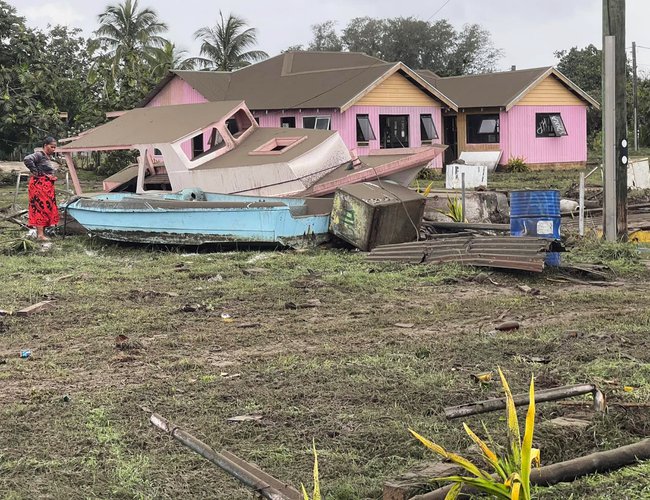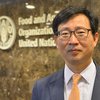
As the world moves beyond the half-way mark toward the internationally declared deadline to achieve the Sustainable Development Goals (SDGs), the road leading to that 2030 destination seems increasingly out of reach, if not completely out of sight.
We all know the world is well off-track to meet those 17 universally agreed goals. From ending hunger and malnutrition in all their forms, to reversing or at least taming global warming to no more than 1.5 C, to ending poverty and inequality – we, as a human race, are failing. Badly.
And while that failure is universally well-understood, it is understood nowhere more acutely than in some of the world’s poorest and most vulnerable countries. I’m referring to those least developed, or landlocked countries – those with no access to the sea – and the many small island developing states that rely on imports for almost everything, while left to the mercy of increasingly hostile weather events.
Of the many things that need fixing, food and agriculture systems stand out. All of these countries mentioned, must transform their agrifood systems to make them more nutritious, more resilient, more innovative and more sustainable to ensure their people can thrive. This transformation goes hand-in-hand with measures to prevent and mitigate the worst impacts of climate change and severe weather that are a menace to their food security.
But they can’t do it on their own. Most simply don’t have the capacity, whether that be enough financial resources, a lack of the latest technical know-how or innovations, and critically, lack of access to inward investment.
The vast Asia and Pacific region is home to some of the most populous and innovative countries on the planet – some of the richest too. Yet, the region struggles with persistent hunger and malnutrition hot spots. While many gains were made in the early 2010s, we find ourselves collectively back-peddling to where we were many years ago.
The reasons are complex, but the threat of climate change to islands in the Pacific and low-lying, heavily populated agricultural zones across much of Asia is no longer a theory, the damage caused is real and evidence-based.
Surely the international community must converge to right this wrong. It does so when it sees other injustices, both natural and man made. It raises its collective voice against war and tragedies at sea and elsewhere. It steps forward, united, in determination.
For the sake of the millions of people of the least developed, land locked and small island developing states of Asia and the Pacific, that global, united determination is needed now more than ever before. Transforming their agrifood systems for better production, better nutrition, a better environment and a better life for all – leaving no one behind – is a goal we can achieve. If we work together, with the right help, these countries can become much more resilient to the threats they face now, and in the days and years to come.
In late June, more than 50 countries – all of them either least-developed nations, land-locked or Small Island developing states are gathering in Rome, at the headquarters of the Food and Agriculture Organization of the United Nations (FAO), to raise their collective voice. No fewer than 14 Member Nations and territories from the Asia and Pacific region are participating, and most are sending their highest-level government Ministers.
The objectives of this gathering are achievable.
They intend to: 1) identify and support the uptake of innovative practices, methodologies, tools and technologies to support SIDS, LDCs and LLDCs to adapt and/or mitigate climate change; 2) to harness collective wisdom and exchange experiences and good practices developed by SIDS and L/LDCs to make development both climate and disaster resilient; 3) to discuss challenges and solutions to bridge the gap in investment required by vulnerable countries to accelerate the achievement of food security and nutrition related SDG targets and, finally, 4) to strengthen cooperation between/among vulnerable Members and the international development community for the balanced integration of the SDG targets in national development strategies and matching financing.
Yes, it’s talk. But talk can lead to action – and action is what’s needed now, more than ever before. The year 2030 is closer than many think and it’s time to take a stand.
Jong-Jin Kim, Assistant Director-General and Regional Representative (Asia and the Pacific), Food and Agriculture Organization of the United Nations.
- In the Asia-Pacific region, countries are turning increasingly toward their neighbours for ideas on sustainable development
- Aug 28, 2024
- Countries In Asia And The Pacific Need To Work Together To Protect Our Common Forest And Fresh Water Resources
- Mar 14, 2024
- INTERNATIONAL WOMEN’S DAY, 2024: Women’s Work: time to recognize their critical role in agriculture –and invest in it!
- Mar 01, 2024
- Soil And Water – Asia-Pacific’s Bread And Butter
- Nov 30, 2023
- It’s A Complicated World But We All Need To Eat– Without Consuming The World In The Process
- Sep 13, 2022













